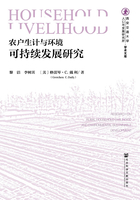
ABSTRACT
Poverty and deterioration of the ecological environment are two major problems in many developing countries. China is also facing the unreasonable use of natural resources, ecological deterioration, biodiversity loss and other issues with population growth and rapid economic development. There is large poor population in the western rural areas in China, and these areas are often ecologically fragile. It is necessary to integrate and solve the problems of population, resources and environment. Chinese governments have implemented many ecological conservation policies, rural poverty alleviation and development intervention programs in these areas, which need to take into account the dual objectives of rural poverty reduction and ecological protection.
The livelihood activities of rural households in ecological sensitive areas are at the core of the contradiction among population, economy, resources and environment, and they are particularly worthy of attention. Based on the theory of sustainable development, micro development economics, sustainable livelihood analysis framework, public policy analysis, etc., the book includes the research on rural households'livelihood behaviors and livelihood activities, the relationships between household livelihood and environment, farmers'attitudes and perceptions towards ecological conservation policies, the impacts of ecological conservation policies on farmer's livelihood and the equity.
As regards to the research methods, based upon the theoretical research on the framework of rural household livelihood and sustainable livelihood analysis, the authors of this book organized several large-scale rural household questionnaire surveys in the poor mountainous and forest rich areas in west China, such as Ankang City, Zhouzhi County, Wuqi County in Shaanxi Province, China, etc. so as to make empirical research on rural household livelihood, environmental sustainability and public policies analysis. Based on the results of theoretical and empirical research, this book also puts forward many suggestions on poverty alleviation and rural development, forestry and ecological conservation, and the innovations of related public policies in rural areas in west China.
The book includes ten chapters and focuses on following three aspects. Firstly, the book makes research on the theories and frameworks of rural household livelihood in poor mountainous areas especially their livelihood choices and decision-making process. Based upon the DFID's Sustainable Livelihood Analysis Framework, the book puts forward quantitative indicators of livelihood assets, livelihood strategies and livelihood outcomes of rural households in mountainous areas in west China, and their amounts and configuration of livelihood assets, types of livelihood activities choices and decision making process and influencing factors, agriculture and forestry production efficiency, multi-dimensional poverty, etc.
Secondly, the book studies the relationship between rural households' livelihoods and environment, farmer's attitudes and perceptions towards ecological conservation policies. The book examines the utilization of forest resources by farmers, such as collection of herbs; and studies different livelihood strategies of rural households, such as forestry-related livelihood, forestry-specified livelihood or diversified livelihood, etc. Due to the extensive implementation of various forestry and ecological conservation policies in the western mountainous areas of China, such as the Sloping Land Conversion Program, Ecological Forest Compensation, Natural Forest Protection Project and so on, the book also analyzes farmers' awareness and attitudes towards these forestry and ecological conservation policies and their forest protection behaviors.
Thirdly, the book makes research on the equity, effectiveness and efficiency of payment for ecological services(PES). The book studies the impacts on rural household livelihood and the fairness of PES Programs, rural integrated conservation and development projects(ICDP), such as the Sloping Land Conversion Program, Small Watershed Management Project and Anti-Poverty Relocation Project, etc.
Ecological services and human well-being are among the hot issues of ecological economics in China and abroad. The research on the relationship among ecosystems, ecosystem services and human well-being is at the core of ecology research currently and leads the development of ecology in the 21st century. Rural households are often the providers of ecological services. This book also belongs to the theme of ecological services and human well-being focusing on the well-being of rural households. The book conceptualizes the rural household welfare, evaluates the SLCP participating households'welfare based on Amartya Sen's theory of Capability Approach and its influencing factors, the relationship between Small Watershed Management Project and the rural households' welfare etc. Then the book also proposes the research framework for ecological service, human wellbeing and public policies. In addition, based on Input-Output Tables and Social Accounting Matrix, the book quantitatively analyzes the impacts of forest eco-benefit tax on industry price levels in Shaanxi Province, China.